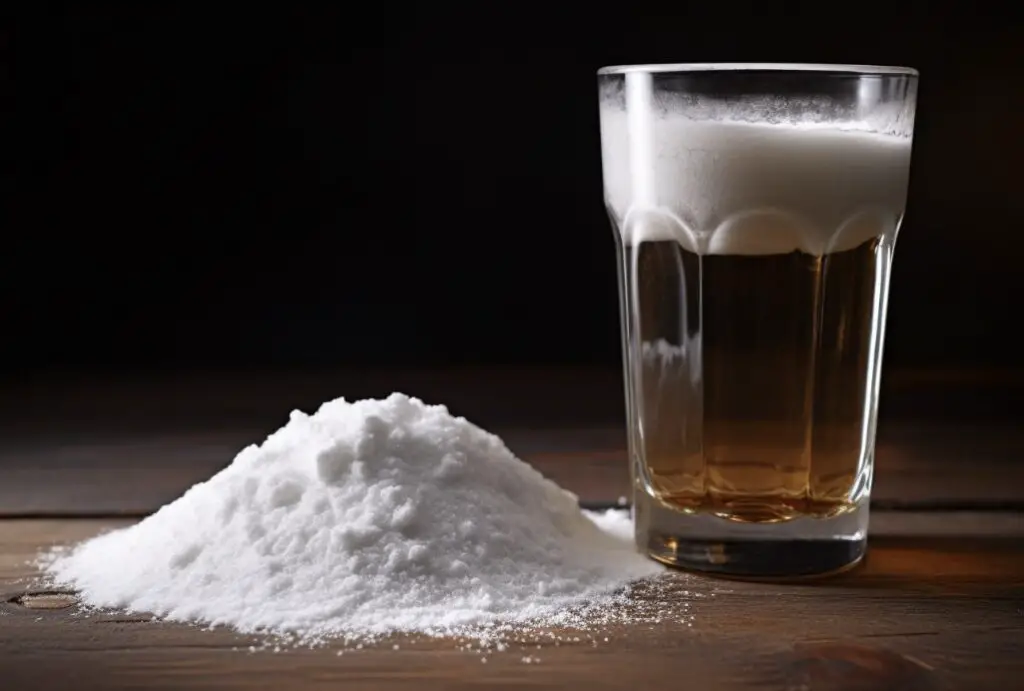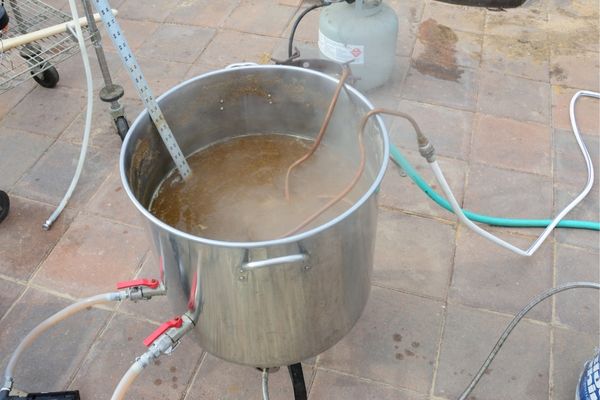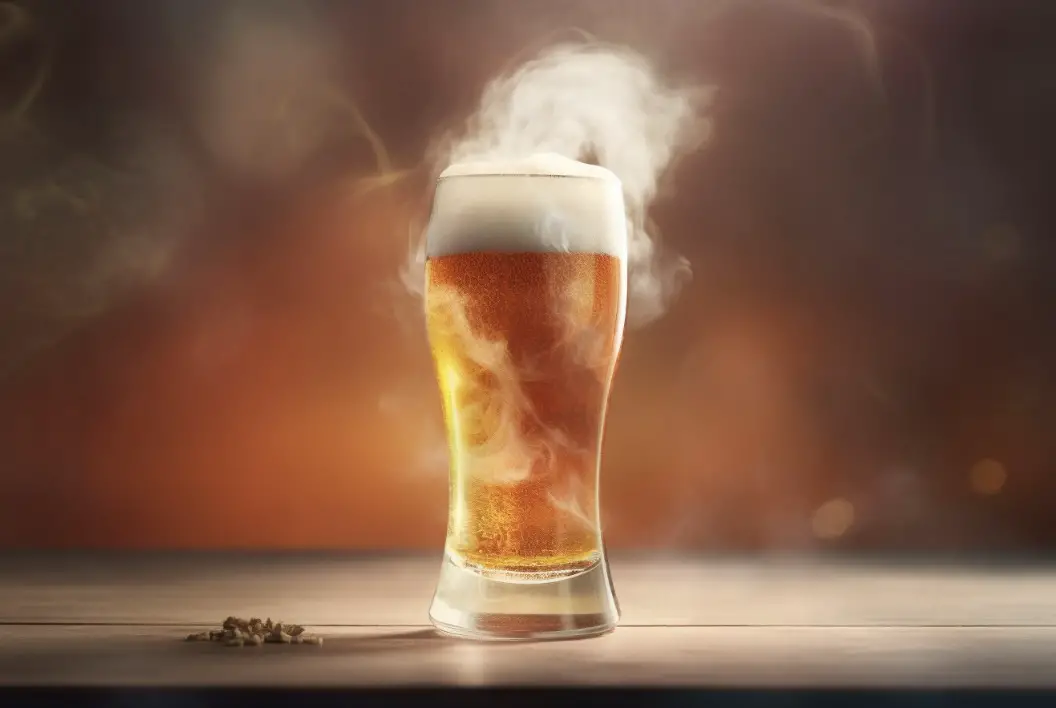As a seasoned brewer, I understand the concerns that many novice brewers have regarding the role of water chemistry in brewing.
One of the most common questions I receive is, “How much gypsum to add to brewing water?”
To answer this question, it is important to understand that the amount of gypsum (calcium sulfate) to add to your brewing water depends largely on the style of beer you are brewing and the initial mineral content of your water.
Typically, the dosage can range from 1 teaspoon per 5 gallons for a light ale to 2 teaspoons per 5 gallons for a hoppy, bitter beer.
However, before you start throwing gypsum into your brew kettle, it’s crucial to understand why you’re doing so and how it will affect your final product. This blog post aims to demystify the topic of brewing water chemistry, focusing on the addition of gypsum.
The Role of Gypsum in Brewing
Before we discuss how much gypsum to add, it’s important to understand the role gypsum plays in brewing. Gypsum, or calcium sulfate, is used to ‘harden’ the brewing water.
Water makes up about 90-95% of beer, so it’s no surprise that it plays a vital role in the taste, aroma, and color of the final product.

Water used for brewing beer contains various minerals and ions, including calcium, magnesium, sodium, sulfate, and chloride.
This hardness impacts the pH level of your mash, which in turn affects the enzymatic activity that breaks down the grains’ starches into fermentable sugars.
The Role of Gypsum in Brewing
So why add gypsum to your mash? Gypsum plays a significant role in the brewing process, influencing both the mash and the beer’s final flavor.
Gypsum, CaSO4, has the ability to increase hardness of the water and lower the pH slightly. It also acts as a buffer to stabilize the pH of your brew, which benefits enzymatic activity.
So it enhances the enzymatic activity during mashing, improving the efficiency of the extraction process. This allows you to get more sugars from your grains, resulting in a higher alcohol content in your beer.

Moreover, gypsum also helps accentuate the hop bitterness in your beer, making it a popular addition for brewers who want to craft a hop-forward beer like an IPA.
The Impact on Beer Flavor
Adding gypsum to brewing water also affects the flavor of your beer. Calcium ions from the gypsum can emphasize the bitterness of your beer, making it an essential addition for hop-forward styles like IPAs and pale ales. It can also add a certain ‘crispness’ to the finish, enhancing the overall drinking experience.
Understanding Your Water Source
Knowing the mineral content of your brewing water is essential before adding anything to it, including gypsum.

You can usually obtain this information from your local water authority or through a home water testing kit.
This knowledge will allow you to make informed decisions about what adjustments, if any, your water needs for brewing.
How to Add Gypsum to Brewing Water
Now that we understand why we might want to add gypsum to our brewing water, let’s discuss how to actually do it.
The process is quite simple: you just dissolve the gypsum in a small amount of water and add it to your brewing water before mashing in.
How Much Gypsum to Add?
As stated in the introduction, the amount of gypsum you add depends on the style of beer you are brewing and the initial mineral content of your water.
Here’s a simple table that indicates approximate gypsum (calcium sulfate) additions based on the general water hardness levels:
| General Hardness (GH) | Approx. Gypsum (CaSO₄) addition |
|---|---|
| 0-50 ppm (soft) | 100-200 mg/L |
| 51-100 ppm (moderate) | 50-100 mg/L |
| 101-150 ppm (hard) | 0-50 mg/L |
| >150 ppm (very hard) | Likely no addition needed |
Note on pH: Mash pH plays a vital role in enzymatic activity and overall beer flavor. Adding gypsum can help lower mash pH, but its effect is relatively mild.
If starting water is alkaline (high pH), even with hardness adjustments using gypsum, additional pH adjustments might be necessary using acid or acidulated malt.
Conversely, if the water is naturally acidic (low pH) and the grain bill contains a significant portion of dark malts (which also lower pH), brewers should be cautious not to lower pH too much by overusing gypsum. Always monitor the mash pH and adjust gypsum additions accordingly.
Always use this table as a starting point. It’s only really done accurately if you get a water analysis report to understand the full profile of your brewing water, including calcium, magnesium, sulfate, chloride, and bicarbonate levels. This report will provide more accurate information and will help in making more precise adjustments.
The Impact on pH and Mash Efficiency
Adding gypsum to your brewing water will lower the pH of your mash, which can improve mash efficiency.

A lower mash pH (around 5.2-5.6) helps enzymes in the mash break down starches into fermentable sugars more efficiently.
Risks of Overusing Gypsum
While gypsum can be beneficial for brewing certain styles of beer, it’s important to use it judiciously. Overuse of gypsum can lead to an overly bitter beer and may even give it a harsh, astringent taste.
Overusing gypsum in beer making can have several adverse effects:
- Taste Imbalance: One of the primary reasons for adding gypsum is to emphasize hop bitterness in beer. However, if used excessively, the beer may end up tasting overly bitter or having a sharp, astringent quality that isn’t pleasant.
- Mineral Aftertaste: Overdosing with gypsum can lead to a pronounced mineral aftertaste, akin to the flavor of hard water.
- Unintended Mash pH Drop: While gypsum can help in lowering the pH of the mash, adding too much can drop the pH too low. An overly acidic mash can inhibit enzyme activity, potentially affecting the conversion of starches to sugars and leading to a lower extraction efficiency.
- Yeast Health: Excessive calcium (which is part of gypsum) can over-flocculate yeast, causing it to drop out of suspension prematurely. This can lead to incomplete fermentation, leaving a beer that’s overly sweet or has a higher final gravity than desired.
- Calcium Overload: Although calcium plays a vital role in the brewing process by aiding in enzyme function, yeast health, and protein coagulation, there is a limit. Too much calcium can lead to beer instability and other unwanted flavor changes.
- Sulfate-to-Chloride Ratio Imbalance: The balance between sulfate (from gypsum) and chloride affects the beer’s taste profile. A beer with a high sulfate-to-chloride ratio will emphasize hop bitterness, while a beer with a higher chloride-to-sulfate ratio will emphasize malt sweetness. Overusing gypsum can skew this balance too far in one direction, which might not be suitable for the style you’re aiming to brew.
- Beer Clarity Issues: Excessive minerals can impact the clarity of the final beer, leading to haziness or other visual defects.
- Interactions with Other Minerals: High levels of calcium from excessive gypsum can interact with other minerals in the mash, potentially leading to precipitation and other unexpected reactions that can affect the brewing process.
In brewing, as with many culinary endeavors, moderation and precision are key. Using gypsum judiciously, based on a clear understanding of your water’s mineral content and the desired beer profile, will yield the best results. If you’re unsure about the exact amount to use, start with a conservative amount, and adjust in future batches based on your observations and tasting notes.
Conclusion
In conclusion, the addition of gypsum before mashing can help improve the malt sugar extraction yield and taste of your beer, especially for hop-forward styles.
It can also help lower the pH of your mash, increasing the efficiency of your brew day.
However, it’s important to understand your water source’s mineral content before making any adjustments and to use gypsum judiciously to avoid negatively impacting the flavor of your beer.
Here are the top 10 facts about the use of gypsum in brewing:
1. Gypsum is used to ‘harden’ brewing water.
2. It affects the pH level of your mash.
3. Calcium ions from gypsum can emphasize the bitterness of your beer.
4. Knowing the mineral content of your water is essential before adding gypsum.
5. The process of adding gypsum is simple: dissolve it in water and add it to your brewing water.
6. The amount of gypsum to add depends on the style of beer you’re brewing.
7. Adding gypsum can improve mash efficiency.
8. Overuse of gypsum can lead to an overly bitter or astringent beer.
9. Always use gypsum judiciously and in moderation.
10. Gypsum can enhance the overall drinking experience of your beer.
From my personal experience, understanding and manipulating water chemistry can significantly improve the quality of your homebrew. However, it’s not something to rush into without understanding the basics.
Take time to learn about your local water source, and remember that brewing is as much an art as it is a science.
FAQs
Does gypsum lower pH in beer?
Yes, gypsum can lower the pH in beer.
How much gypsum do I add to mash?
The amount of gypsum to add to your mash depends on your specific brewing recipe and desired water chemistry. It is typically recommended to add around 1 to 2 grams of gypsum per gallon of water to enhance the hardness and adjust the pH level. However, it’s important to consult a brewing resource or use brewing software to determine the precise amount based on your water profile and target beer style.
How much does gypsum lower pH?
Gypsum can lower pH levels to some extent, but the exact amount depends on various factors such as soil composition and initial pH.
Does gypsum alter pH?
Yes, gypsum can alter pH levels. It usually lowers and stabilises it.
What does gypsum do for mash?
Gypsum helps improve the quality of the mash by adjusting the water chemistry. It enhances the brewing process by lowering the pH level, promoting enzyme activity, and enhancing hop bitterness.




